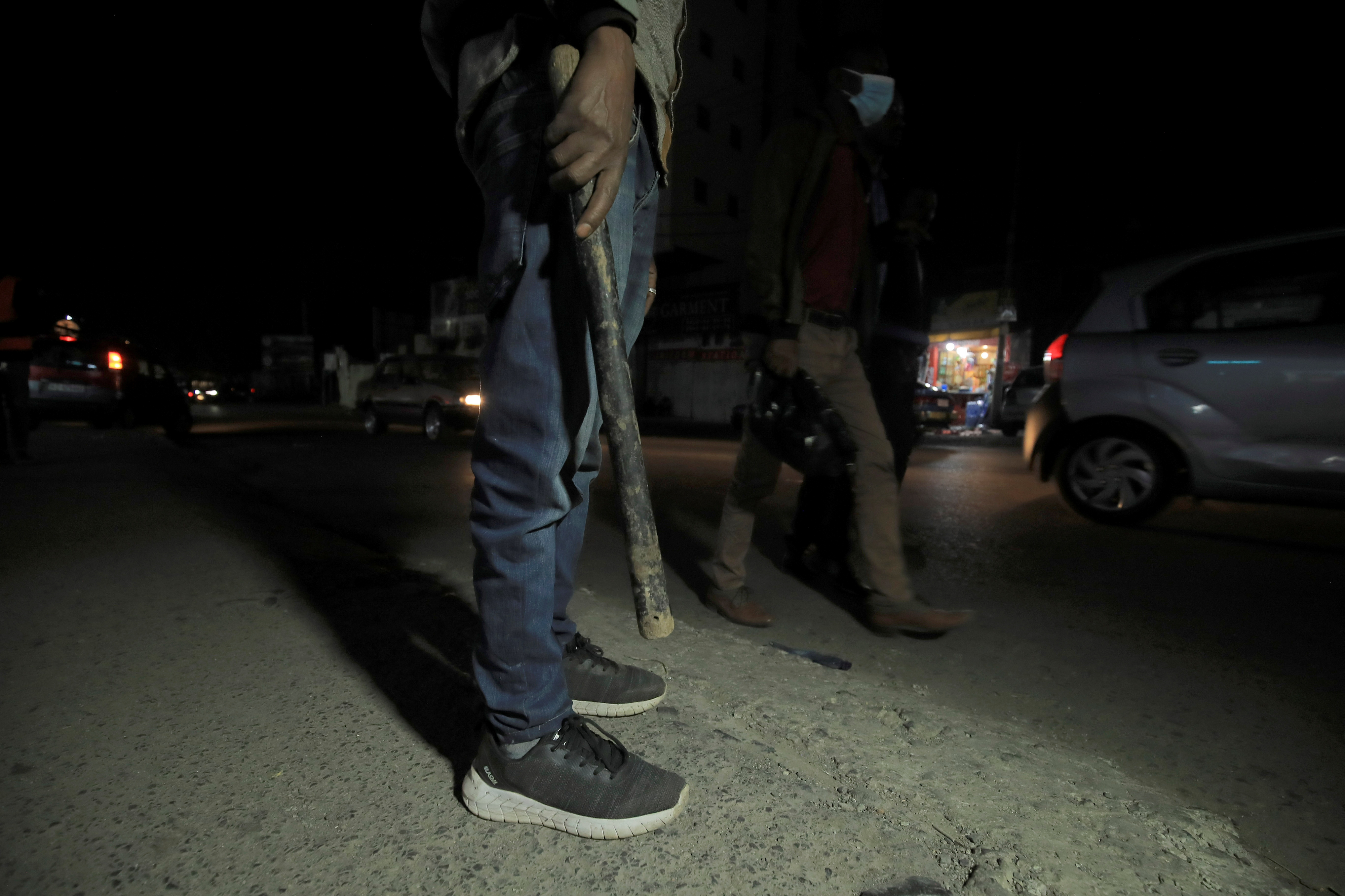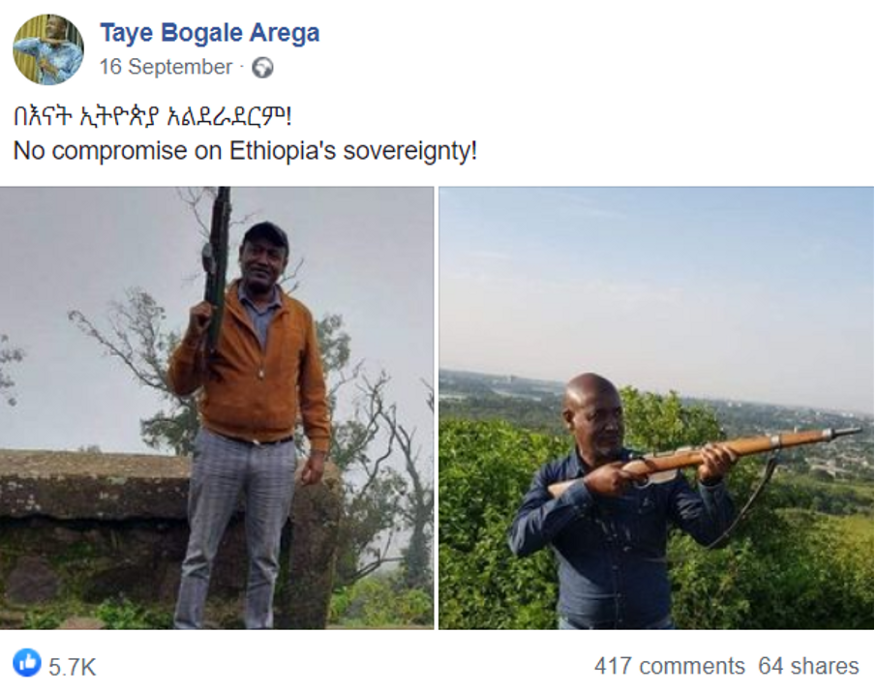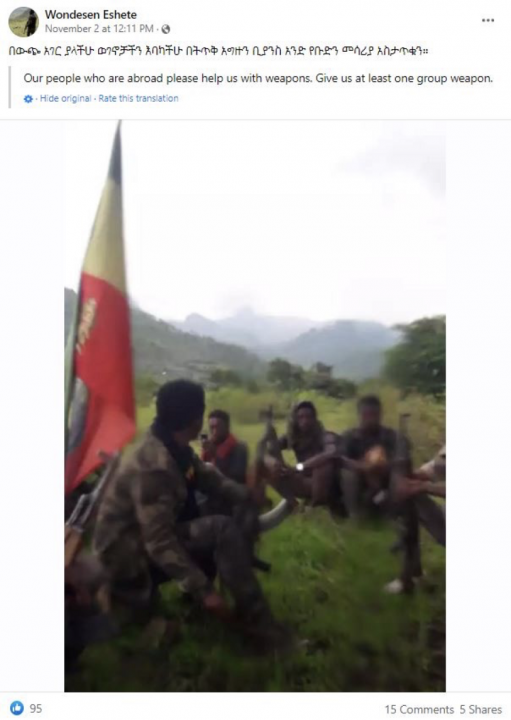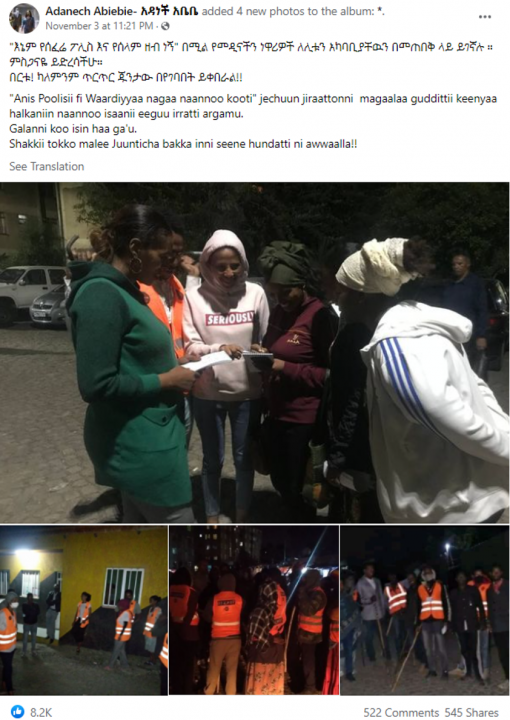Influential Ethiopian social media accounts stoke violence along ethnic lines
Proliferation of hate speech on social media has the capacity to cause real-world harm amidst an increasingly violent civil war.
Influential Ethiopian social media accounts stoke violence along ethnic lines
Share this story

BANNER: Vigilantes armed with clubs stand guard at a neighborhood in Bole following the Ethiopian Prime Minister Abiy Ahmed’s call for citizens to protect their areas from the Tigray People’s Liberation Front (TPLF), November 19, 2021. (Source: REUTERS/Tiska Negeri)
Disclaimer: this article contains examples of hate speech.
Since the start of civil war in Ethiopia in November 2020, social media has been awash with calls for violence against specific ethnic groups. Words such as “terrorist,” “killers,” “cancer,” and “weeds” have been used to describe people and groups from across the country, including the Tigray People’s Liberation Front (TPLF) and the Ethiopian government under Prime Minister Abiy Ahmed, the two primary adversaries in the conflict.
In response to a recent proliferation of hate speech on social media platforms, Twitter announced on November 5, 2021 that it had disabled its trends list for Ethiopia to “reduce the risks of coordination that could incite violence or cause harm.” Facebook, meanwhile, published an update of its security protocols for protecting people in-country and curbing the spread of hate speech on November 9. This came in the wake of Facebook removing a post by Ethiopian Prime Minister Abiy Ahmed for violating the platform’s policies against inciting violence. The post called on citizens to take up arms and “organise and march through [any] legal manner with every weapon and power… to prevent, reverse and bury the terrorist TPLF.”
According to Facebook’s current policies regarding violence and incitement, the platform removes content containing language that “incites or facilitates serious violence.” Additionally, users are not permitted to post “threats that could lead to death (and other forms of high-severity violence) targeting people or places.” This includes “aspirational or conditional statements to commit high-severity violence.”
Despite these policies, Facebook has received repeated criticism for failing to take down violent posts in local Ethiopian languages, including Tigrinya and Amharic, as noted in Washington Post coverage of internal Facebook documents leaked by whistleblower Frances Haugen. Information from the leaked document suggested that Facebook teams had flagged a network of accounts promoting disinformation about the conflict and inciting people to take up arms. The network was linked with the Amhara militia Fano group, which has been accused of human rights abuses during the current conflict.
Facebook ultimately de-platformed Fano-linked assets in early December for violating its Violent Non-State Actor (VNSA) policy. According to a spokesperson for Meta, Facebook’s parent company:
The designation of any organization as a VNSA will result in a removal of content that supports or represents the organization or its members as well as the removal of their presence from our family of apps. Under this policy, praise for the group will be allowed except for content that praises violence, which will be considered violating.
Meanwhile, on December 14, the Oversight Board ruled on a post that was automatically flagged by Facebook’s Amharic language systems. The post, which made unverified claims that the TPLF and Tigrayan citizens committed atrocities in an Amhara village, was restored despite being labeled as hate speech by two of the company’s Amharic-language content moderators. The Board ruled that Facebook should remove the post again, saying “rumors alleging that an ethnic group is complicit in mass atrocities, as found in this post, are dangerous and significantly increase the risk of imminent violence.” According to the ruling, the user who created the post did not “even provide circumstantial evidence to support his allegations.”
This is not the first time Facebook in particular has come under fire for allowing hate speech to fester; in 2020, a dedicated disinformation campaign was used to vilify prominent Ethiopian musician Hachalu Hundessa, who was later assassinated. Following his death, rampant hate speech and incitement to violence sparked mobs that led to hundreds of deaths. Since then, Facebook has released community standards guidelines in both Oromo and Amharic.
The DFRLab identified 27 examples of possible hate speech and incitement to violence and shared them with Facebook. After an internal assessment, Facebook removed 15 of them for violating policies on inciting violence. According to a statement released to the DFRLab by Meta:
A number of the posts that were flagged by DFRLab and included as examples in the article had already been actioned, and removed by Meta over the last few months. We have taken additional steps and will continue to leverage our proactive tools to find any duplicates of violating content which we will remove. Of the separate 27 pieces of content shared by DFRLab and reviewed by Meta, 15 were actioned and deleted for Violence & Incitement violations. The remaining 12 were found to be non violating as some were shared in condemnation or in an awareness raising context, whilst others either targeted institutions and/or had no obvious threat. Our Community Standards make clear what is and isn’t allowed on Facebook, and as soon as we become aware of violating content, we will remove it.
Additionally, Meta noted some of the actions it has recently taken in response to the ongoing conflict in Ethiopia and in the lead-up to the general election last June. These include expanding its capacity to review content in Amharic, Oromo, Somali, and Tigrinya; developing technology to automatically identify hate speech and ethnic slurs, resulting in more than 92,000 pieces of content being taken down between May and October 2021; removing coordinated inauthentic behavior in Ethiopia; releasing political transparency tools; and running a media literacy billboard campaign across 43 locations in Addis Ababa, “the first of its kind for Facebook across Africa.”
Online violence in Ethiopia
In March 2020, Ethiopia enacted the Hate Speech and Disinformation Prevention and Suppression Proclamation, which gave the government recourse to fine and imprison citizens for comments made on social media. Civil society groups, including Human Rights Watch, criticized the proclamation for its violation of the freedom of speech and its broad-sweeping definition of hate speech. Under the legislation, if the offense of hate speech or disinformation offense has been committed through a social media account having more than 5,000 followers or through a broadcast service or print media, the person responsible for the act could be punished with imprisonment not exceeding three years or a fine up to 100,000 birr (approximately USD $2,120).
However, the DFRLab has identified multiple accounts on both Twitter and Facebook with over 5,000 followers that recently posted hate speech without repercussion from the government. Some of these accounts are themselves operated by government employees or are government-aligned organizations. It is unknown whether the lack of prosecution of these accounts is a sign of selective enforcement or a general lack of resources to pursue those in violation.
A post that received severe backlash online was created by pro-government activist Dejene Assefa, whose Facebook account has over 121,000 followers and whose posts regularly receive thousands of likes and hundreds of shares. In late October 2021, Dejene published a Facebook post stating, “the war is with those you grew up with, your neighbor,” and calling on people to act against the “traitors” even if they do not want to do it.
The post was called out by social media users, including by algorithmic bias expert Timnit Gebru, and subsequently removed by Facebook. However, the DFRLab identified an additional ten pages, with a combined following of over 382,000 followers, that had reposted copied version of the text. According to Facebook, the company is working to remove duplicates and prevent further sharing.
In another post that was shared nearly 1,400 times, Dejene stated there was still time to cut the necks of the “traitors” and sing victory songs on their graves. The post was flagged by the DFRLab and removed by Facebook for inciting violence.
Violent rhetoric has also been documented from TPLF leaders and supporters. On November 12, Getachew Reda, advisor to TPLF leader Debretsion Gebremichael, tweeted an official press statement from the Tigray regional government on “nefarious foreign actors.” The post referred to Abiy’s government as “parasitic” and “predatory,” language similar to Abiy’s July 2021 claims that the TPLF were a “cancer” and an invasive “weed.” The press release also said, “The Government of Tigray and Tigray Armed Forces are not liable for any harm that foreign citizens knee-deep in Abiy Ahmed’s criminal enterprise suffer as we exercise our legitimate right of self-defense by taking proportional measures to ensure our people’s safety and security.” At the time of writing, the original tweet remained active on the platform.
On Facebook, Getachew, who has almost 174,000 followers, regularly posts updates corresponding to the Tigray defense forces capturing of different cities. These posts often contain demands for opposing forces to give up or face retribution.
Calls to arms
Posts similar to Prime Minister Abiy’s November 2021 call to arms, which Facebook removed for inciting violence, have appeared on the platform. Many of these posts, however, were less overtly violent. While Abiy called for citizens to arm themselves in order to “bury” the TPLF, other prominent users were more subtle in their calls to arms.
On September 15, 2021, Taye Bogale Arega, an historian who has been vocal in his support of the Ethiopian government, called for the TPLF and supporters to be “eradicated.” The following day, he posted two images of himself holding a rifle. While his post on eradicating TPLF supporters has been removed, the images of him posing with a rifle remain on Facebook at the time of publishing. Taye has over 263,000 followers on the platform.

Another profile posted a blurry image of Amhara militants on November 2 asking for supporters from abroad to donate weapons, saying “give us at least one weapon.” The post, which Facebook has now deleted, was created the same day Abiy announced a six-month state of emergency and authorities in Addis Ababa called on citizens to ready themselves to defend the capital by registering their own firearms. The state of emergency requires citizens to carry identification at all times, allows for random raids by security forces, and gives police the ability to detain without a warrant anyone suspected to have connections to the “terrorist group” — i.e., the TPLF.

Following the implementation of the state of emergency, Addis Ababa Mayor Adanech Abiebie congratulated residents of the capital for taking the initiative to patrol the streets. She said the “Junta” would be buried as a result and encouraged citizens to continue acting as police and peace guards.”

Since the state of emergency was announced, the BBC reported that thousands of Tigrayans in Addis Ababa have been arrested under “suspicion” of supporting the TPLF, raising concerns among human rights groups.
Influence from abroad
The DFRLab also found significant amounts of online hate speech originating in diaspora communities located outside of Ethiopia.
Zehabesha, an influential Minnesota-based broadcasting company with over 1.5 million Facebook followers, posted an image of a devil and the Tigray flag alongside text calling the TPLF derogatory names. The post remained active at the time of publishing. In early November, Zehabesha also published a video interview with a Fano leader that called for all Tigrayans to be placed in concentration camps. Facebook removed the videos, though copies of it shared in the context of condemning the remarks remain on the platform.
Ethiopian Satellite Television (ESAT), based in Washington, DC, has also been accused of spreading hate speech against Tigrayans as far back as 2016. In late October, digital rights activist Berhan Taye reported a Facebook post by ESAT broadcaster Mesay Mekonen that also called for all Tigrayans to be placed in concentration camps. Facebook initially told Taye that the content did not violate its community standards policy. The post was eventually taken down, although it had been shared over 6,000 times and the same text has been copy and pasted elsewhere on the platform.
Multiple videos posted by Mekonnen Kebede, a US citizen with 69,000 followers on Facebook, were removed for hate speech and inciting violence after being flagged by the DFRLab. In one video, Mekonnen, who has close links with the Fano militia and has posted photos and videos from the front lines, called for the death of 7 million Tigrayans. Before being removed, the video had received over 182,000 views. Another now-deleted video promoting the removal of the Oromia region from Ethiopia’s map and inciting violence against members of the Oromo ethnic group was viewed more than 91,000 times. A video used to raise funds prior to Mekonnen joining the war effort was also removed, although it is unknown whether the requested funds were directed specifically to the Fano militia.
On November 2, the verified Twitter account for Kenyan writer Dikembe Disembe, which has over 330,000 followers, tweeted in English, “Ethiopia must annihilate Tigray just like Rwanda humbled the Hutus.” The post was reported and quickly removed, to which Disembe tweeted the response, “TPLF bots. TPLF is a terror group Ethiopia must rid.”
According to the BBC, posts written in local languages other than Amharic, the most widely spoken language in Ethiopia, “are less vulnerable to being reported and blocked.” This has allowed social media users across the board to demonize war refugees and call for genocide against ethnic minorities. Although recent media attention has focused on Amharic content, violent rhetoric has persisted on social media since the war broke out in 2020, and continues to spread across multiple platforms.
Cite this case study:
Tessa Knight and Beth Alexion, “Influential Ethiopian social media accounts stoke violence along ethnic lines,” Digital Forensic Research Lab (DFRLab), December 17, 2021, https://medium.com/dfrlab/influential-ethiopian-social-media-accounts-stoke-violence-along-ethnic-lines-6713a1920b02.

